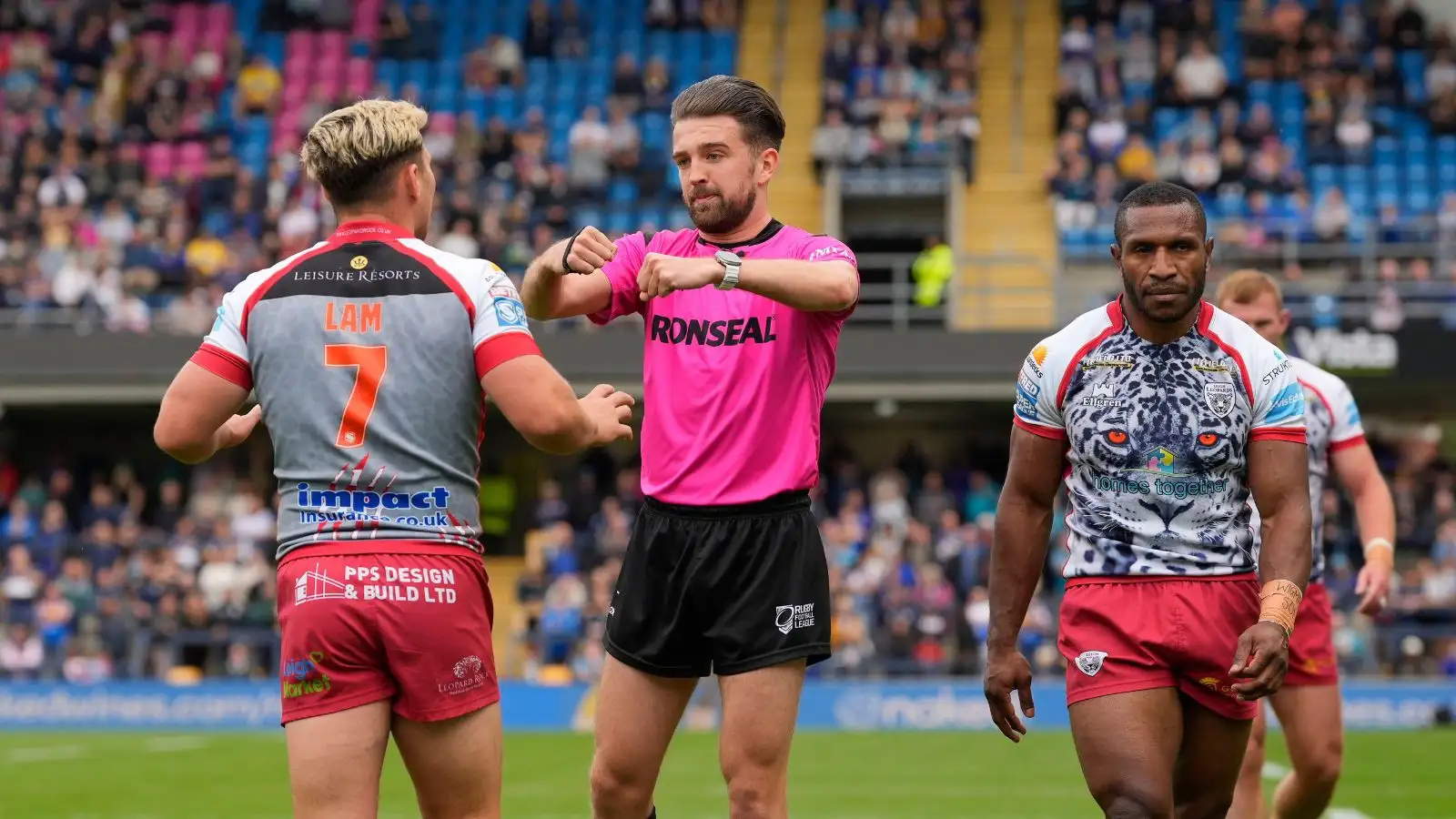Rugby League doesn’t want you: Why Marcus Griffiths abuse must prompt change – column

Photo by Steve Flynn/News Images.
Rugby league referees have finally had enough of incessant abuse and called out the “horrific” vitriol that has become an unwelcome part of their job.
Top official Marcus Griffiths last night publicly thanked the “truly overwhelming” amount of messages of support he has received since sharing abuse he was sent online.
“The support I’ve had from my colleagues in the full-time group, the RFL and people from across the game has shown what rugby league should be about and why we live this sport,” said Griffiths.
“Referees are human, we make errors and we’re not beyond criticism, but homophobic abuse is always a step too far. Let’s continue to challenge behaviours and remove them from our great game.”
A new low was reached last weekend as Griffiths revealed the homophobic abuse and death threats he received after that week’s Super League action.
His crime? Going to work, refereeing Huddersfield versus Leeds, a match which saw the Rhinos lose 21-12 to leave their play-off hopes hanging by a thread. Leeds bounced back with a win at Hull FC but need a miracle to make the six.
Griffith’s colleagues, including another much-targeted referee Chris Kendall, rounded on the “horrific” situation. “It is not a thin line between disagreeing with calls and abuse” wrote Kendall, one of the game’s leading refs. “Go find another sport, rugby league doesn’t want you”.
Rugby Football League condemn abuse
Such was the severity and sinister nature of the most recent social media abuse received by Griffiths, that the Rugby Football League immediately issued a statement supporting their official, condemning the abuse as a hate crime, and urging “all involved in the sport, whether at clubs or even in the media, to consider the consequences of their words and actions.”
The most depressing part of this is that when Griffiths first went public with the messages he had received, many of us didn’t bat an eyelid.
So accustomed have our eyes become to this kind of poison online. Indeed those referees active on social media, including Griffiths who is a full-time official, seldom react despite the most extreme and hateful provocation.
So how did we get here and where on earth does it end?
The second question is straight forward – it will end with no referees and therefore no game. There is responsibility to be shared throughout the sport therefore to ensure we all start to get real with this.
Respect starts with those at the heart of it.
The players and the coaches, as we learned from the Josh Griffin episode with Kendall at Hull earlier this season and how well his coach Tony Smith dealt with it, ignoring the baying mob and backing the officials rather than his own player. Griffin never played for the club again.
Yet many leading coaches – most recently St Helens boss Paul Wellens and Salford’s Paul Rowley – have lost patience and rounded on match officials and the governing body.
While accepting that there has to be a place for fair scrutiny and that poor standards – be it players or officials – should be highlighted to ensure improvement – there has to be more thought to consequence.
Leeds coach Rohan Smith came out against the abuse received by Griffiths last week and rightly drew the distinction between the unacceptable and the acceptable, namely scrutinising refereeing standards and controversial moments.
The latter is fair game and important to accountability. But at the same time there was little recognition that in openly criticising Griffiths himself in his post-match press briefing, Smith would inevitably be fuelling the lynch mob straight away. There has to be a better way of questioning officiating standards than throwing individual referees under the bus via the media.
According to reports in Australia, the NRL are even considering banning coaches on commenting on referees during their post-match press conferences – having previously outlawed all talk on officiating back in 2015.
And that brings us to the role of the media, in a modern world now dictated by social media, a simultaneously powerful news provider and grotesquely addictive swamp of hate. One which seems to have diluted our conscience of any ounce of responsibility, any thought of impact or consequence.
The media landscape has changed unrecognisably to the place we now live in whereby success is judged as much by the number of clicks on a story as it is the quality of journalism within it.
Pieces on referees always do well – look I’m writing another one myself – and as such some publications have developed an unhealthy desire to replay any controversial moment in front of a knife-sharpening public gaze, and then leave it for the vultures to feast upon on social media.
In short it incites a pile-on and we journalists should have a better moral compass that that.
Even the weekly announcement of which referee has been allocated which game now merits a story or a social media post in its own right, and you can imagine the comments and responses each one provokes.
To silence the trolls we need to first think what we are feeding them, knowing we have the power to affect their appetite. Again, as the RFL so succinctly advise, all involved in the sport must consider the consequences of their words and actions.
READ NEXT: Super League clubs ranked by their 2022 financial losses: St Helens 2nd, Wigan 5th, Hull 9th